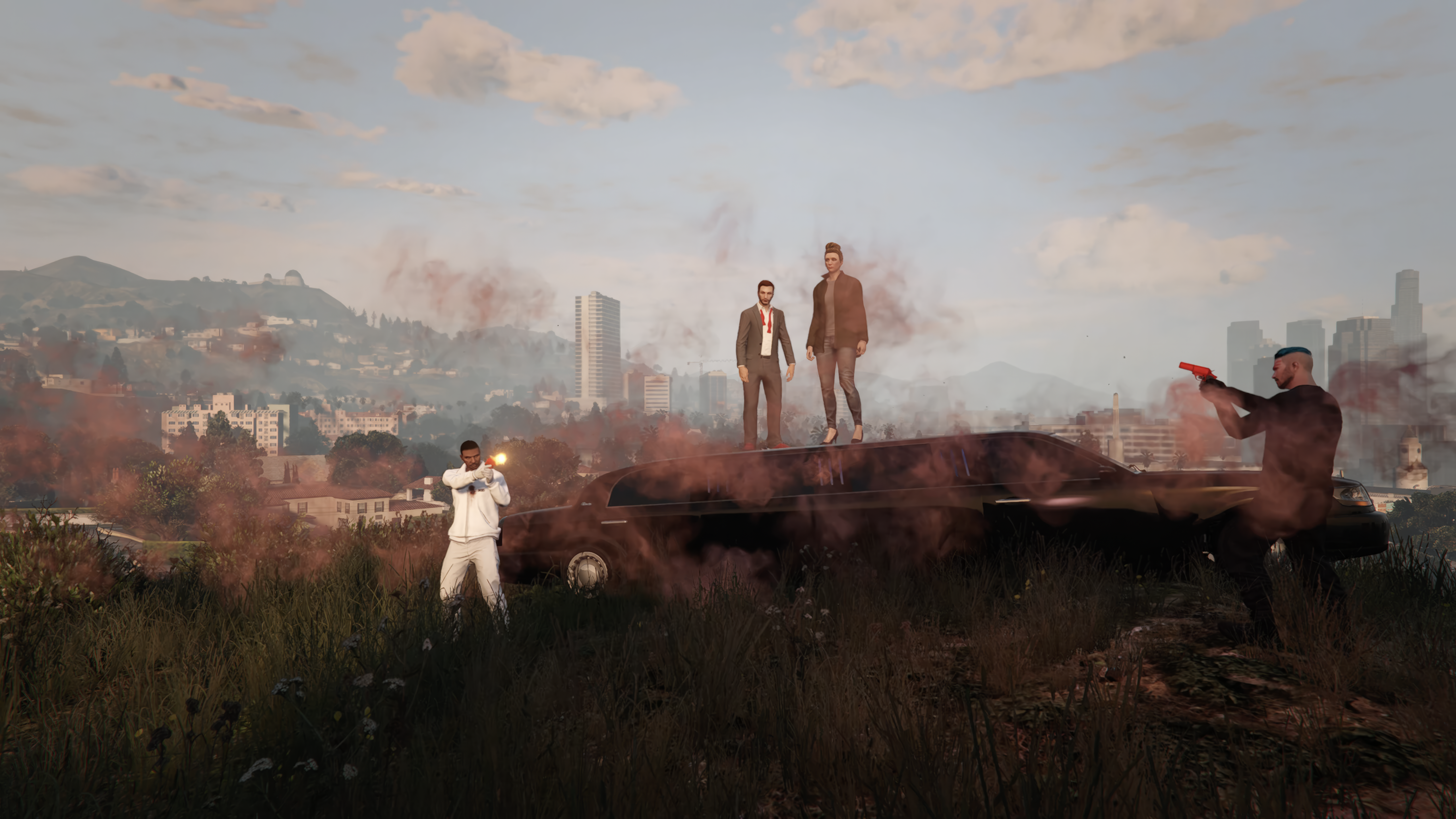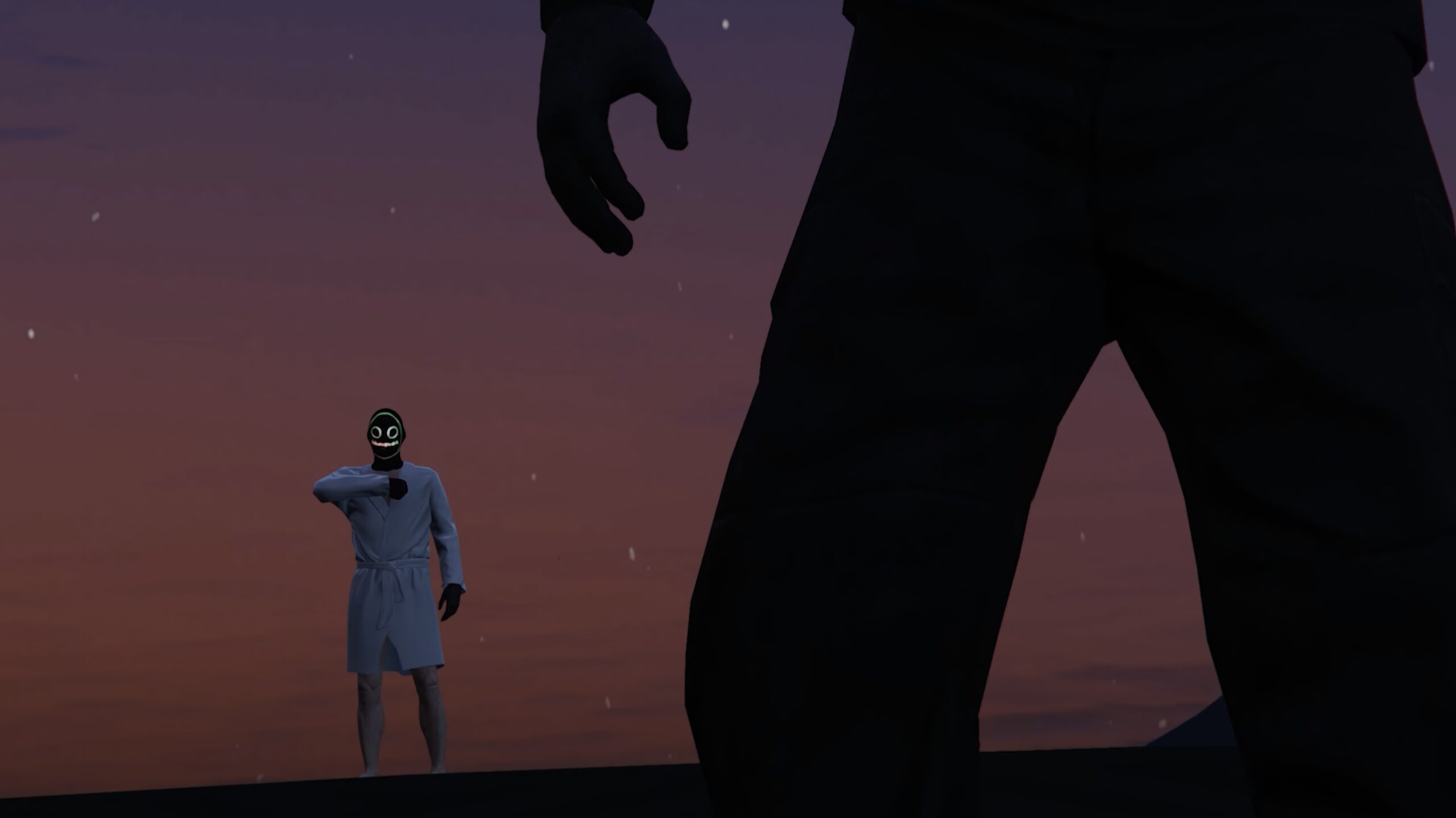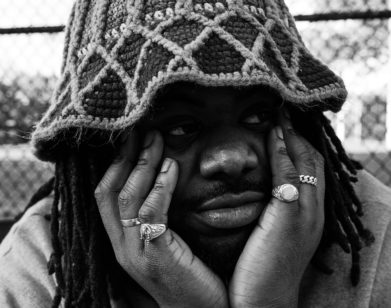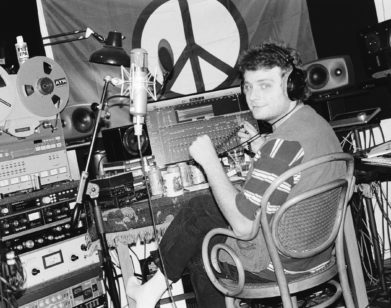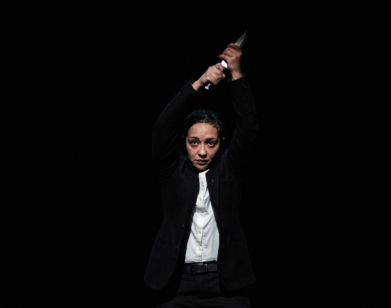GAMERS
How Sam Crane and Pinny Grylls Merged the Worlds of Shakespeare and Grand Theft Auto
During the pandemic, two out-of-work English actors, Sam Crane and Mark Oosterveen, fired upa game of Grand Theft Auto. After a couple hours of wanton violence and degenerate gambling, the two stumbled upon a section of the map they’d never encountered before: an amphitheater. As actors, their dramaturgical brain was tickled, and as they walked through the empty rows, an idea was born: what if, in a universe only known for destruction, we put on a performance of Hamlet? Over the next year, the two embarked on a quest to recruit live characters from the game to be players in their production. The documentary, Grand Theft Hamlet, co-directed by Crane and his wife Pinny Grylls using only in-game footage, chronicles their tumultuous quest. What results is a film unlike any that has come before it, where ideas of character and representation are refracted through multiple universes—the personal, fictional, and dramatic puréed into one. A play is put on within a play within a video game within real life within a documentary. It is often absurd, regularly poignant, and always wholly modern. To find out how they did it, we sat down with Crane and Grylls to discuss modes of representation, methods of storytelling, and introducing Shakespeare to a generation of gamers.
———
JACKSON WALD: This film is billed as a documentary, but scattered throughout it are rehearsed scenes where you talk about yourselves in your real life within the artifice of the game. How does one make a documentary that also includes auto-fictional elements?
PINNY GRYLLS: The documentary form has really developed over the last 20 to 30 years. You look at Joshua Oppenheimer’s films, where he works with real people to play themselves, and recreate things that happen to them. There were moments where we really do play around with the audience’s sense of authenticity.
SAM CRANE: We want to imagine that the audience is sophisticated enough to have an interest in these different playful ways of representing reality. There’s so much out there now that is fact-based but also plays with form a lot.
GRYLLS: If you go into Werner Herzog’s idea about ecstatic truth, where whether it actually happened like that, in that order, is the least interesting thing, but the most interesting thing is, is it emotionally true? Is it really what happened to these guys? We had 300 hours of footage, and most of it was rehearsals and people blowing each other up. That’s not going to sustain 90 minutes. There’s got to be some things in there that we can find that are about our emotional journey. And some of the scenes genuinely did happen in front of us and were edited like you would like an observational documentary. For instance, Mark [Oosterveen, Crane’s co-star] confesses that his last living relative has died while he’s waiting for people to turn up to the audition. That was a genuine moment, and I really did not know what to say, because I thought it was so incredibly sad that he was now alone in the world.
CRANE: Some people think that was scripted.
GRYLLS: Mark actually got really upset when someone wrote that [it was scripted] on a blog after release. Because it is quite personal stuff, right? When someone says, “Oh, you’ve scripted that,” it’s like saying, “Your life’s not real.”
WALD: These layers of truth in the film are like an onion. You are yourself in the real world. You are a digital avatar in Los Santos. You are your character in Hamlet. And you are the subject of a documentary. Eventually, it seems to get jumbled up together, and you don’t know what is true and what is just the essence of the truth.
CRANE: That’s what Hamlet is about. Hamlet gets the players to put on a play in order to find out the truth of what happened to his father. To find out the conscience of the king. It’s a representation, an analog to what happened, but not what actually happened.
GRYLLS: Shakespeare is basically commenting on his own practice as a theater maker. He’s saying, “I put on pretend stories about fictional medieval Denmark, and through watching this, it is saying something about tyranny, or something that’s really happening in the world.”
CRANE: I think it’s true that Shakespeare himself performed as one of the players in it, and also as the ghost.
GRYLLS: He often talks about life being like a stage, that we shuffle on and shuffle off.
CRANE: “Life’s but a walking shadow, a poor player, that struts and frets his hour upon the stage,” which Mark says in the film.
WALD: You guys mentioned Brecht in a previous interview, and it reminds me of his idea of historification; telling stories that are relevant in our time, but in a different time. And telling this story through the lens of GTA, which is also the most satirical, disgusting representation of America, and then also through Hamlet. It’s hard to fully even wrap one’s head around it.
GRYLLS: That’s the point, right? It doesn’t matter that you to solve it. It’s enough that it is complicated.
CRANE: That’s why we made the film. Because rather than to try and explain in three complete sentences, it’s like, no, the film is complex, it is messy.
GRYLLS: When we were editing the film, I knew that there were all these incredibly interesting layers. And I was like, should I explicitly talk about that? Should I interview Sam and maybe he could talk about that? But I took all that out, because I actually think the action of doing what we did in that space, and filming it in the way we filmed it, is enough. And it’s more enjoyable for the audience. They don’t want to sit there and listen to a lecture. They want to watch a story about these guys. And you want to feel emotionally connected to them. And then afterwards, you can have that moment when the film goes off and you’re like, “Well, hang on a minute. What did I just watch?”
WALD: Was it a challenge, Sam, as a classically trained theater actor, where you have to hit your cues and marks, to exist within a world where perfection is unachievable?
CRANE: This idea of classical theater as being a pinnacle or being perfect, is something I’ve been trying to get away from, and is part of the reason why doing the film in this way was so good. Shakespeare, when it was first done, was very much a rough, rowdy, imperfect, chaotic world. It wasn’t highbrow. It wasn’t considered intellectual. And that’s what it should be. It should be about stripping away all the artifice and etiquette around it.
GRYLLS: When you look at sort of the technical aspects of theater, and what makes a theater production interesting to watch, it’s is when that actor isn’t perfect. [Sam has] worked with Mark Rylance quite a bit. And he has this affectation of imperfection. He stumbles over his words. He doesn’t hit his mark. Sometimes he’s not quite perfect.
CRANE: It just brings it alive. When you can see someone fumbling around and stumbling and getting it wrong, that’s when you’re like, “Oh, this is interesting.” Because it’s human and fragile and vulnerable. Us having this conversation, the three of us now, is a live thing. And you may have some prepared questions, which you would see as a script, and we’ve probably got things we’ve thought about and spoken about before. That’s maybe the framework it exists in, but then it diverges from that, and that’s where it’s exciting, you know?
GRYLLS: That’s real conversation.
WALD: Hans Ulrich Obrist, a Danish art critic, talks about video games as the medium where the next great art is going to be made. Has this experience radicalized or led you to be more interested in hyper-modern ways of telling stories?
GRYLLS: It’s a very exciting space to be making things in. I think that immersion gameplay is the next frontier. It’s like playing with the edges of the map. It’s like poking at the game, and seeing if it comes undone. It’s trying to create something that the game wasn’t designed to do. Human beings are unique in that respect. They don’t play by the rules. They interrogate. They are interested in seeing, “How far can I go?” It’s that little child in you that wants to transform a tree into a treehouse. That’s what we do as humans. We transform the world. And game spaces are places with so many billions of people hanging out. Of course, it’s going to happen that a couple of weirdos go and do Shakespeare.
CRANE: In some ways, it is achingly modern in a format, but it’s also a form that enables us to uncover a more ancient way of approaching it. That kind of playfulness has been around forever. In a theatrical context, I think this world affords a relationship with an audience that’s more like an early modern Shakespearean relationship, or even an ancient Greek relationship. Where it’s not like you’re not on a stage under light, you can’t see the audience, and there’s real separation. We’re here in an open space. The other spectators are with us as performers in the same space. An open world video game and, in a Shakespearean sense, The Globe, a shared light space, have a dynamic equal relationship.
GRYLLS: We really wanted to blow up this idea of a high art and low art. There’s a false separation between the two. Why can’t people just stumble upon Shakespeare inside this game?
CRANE: And also, why isn’t a video game just as valid an art form as classical theater? GTA is a phenomenal cultural achievement.
GRYLLS: There’s something incredibly deadening about this idea that going to go see a Shakespeare play is almost like eating your greens. Why should it be like that?
WALD: Speaking to the class element, it costs $60 to buy the game. And from that point on, you can be a player. You can perform Shakespeare. But to become an actor in the real world, you need lessons and performances and camps. This format, beyond even being digital, is the truest possible leveling ground.
GRYLLS: My filmmaking has always been about the banality of the creative act. I made a film called The Hour, about actors the hour before they go on stage at the National Theater in London. I was interested in the banal nature of actors and people. They’re just people, and yet they are transformers. They transform themselves into gods, into something that feels almost untouchable. There’s something beautiful about humans in ordinary circumstances, in boring lives, making a magical thing like a piece of play or art. And if you even think about Shakespeare himself, he’s probably incredibly ordinary. He probably had a very day-to-day life. There’s something magical about that.
WALD: Like how Elvis died on the toilet, right? I’d like to throw a thought your guys’s way: people are bearish on Gen Alpha and Gen Z. They’re on their phones too much. They’re too entwined with the digital world. But I wonder if maybe we might witness the kids who stream and perform on Twitch blossom into the next great Shakespearean actors.
GRYLLS: It’s a really interesting question, because I wonder how the world that you grew up in changes you as a storyteller. My grandmother, for instance, was a brilliant storyteller. She could just sit and tell a story that just went on and on. I always thought that was because there wasn’t much entertainment when she was young. She grew up quite poor, and literally just sat around and told stories and sang songs when she was a child. And is that something that we’ve lost, or is this generation doing that but through a digital [medium]?
CRANE: As generations go on, you think, “Oh, they’ve lost this way of doing that.” But what if you don’t engage with that culture; yes, some video games are not great. Some TikToks are probably shit. But you can find people who are using that form in a really clever, sophisticated way.
GRYLLS: The problem is that media is so ubiquitous and people are making so much stuff that it’s hard to wade through the shit stuff to get to the good stuff.
CRANE: The way we access stuff now is so controlled, algorithmically, that it’s difficult for truly interesting stuff to find a way through. When you’re scrolling through Instagram, you probably get the same type of comedy again and again and again and again, because that stuff plays well. I remember watching Twin Peaks on terrestrial television for the first time and being totally entranced by it. I would never have thought to watch that. No algorithm would have given me that.
WALD: What has it been like now, doing press, touring, and talking about the film, but also being so far removed from the actual moment in which it was created?
CRANE: It does seem like a kind of distinct period of time now. It’s weird, because when we were making it and getting it out there, it felt almost like our present moment, because [COVID] had just happened. Now, when I occasionally watch the film again or talk about it, COVID does seem like a moment in history.
GRYLLS: I think maybe when we were doing it, we really did know that it was something special, if I’m being honest. We knew nobody else gave a shit yet, but we gave a shit. And now we’re starting new projects and we feel like we’ve gone up this mountain and seen this amazing view, and we know what it’s like to do something that’s quite successful. We’re now at the bottom of the mountain again. It’s sort of like the trial of Sisyphus. Now we’ve got to start from the beginning with something, and no one cares, except people do care more. But they still don’t really care. That’s the point, you know?


